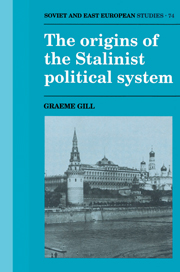Book contents
- Frontmatter
- Contents
- Preface
- Abbreviations
- Introduction: What is Stalinism?
- PART I COHESIVE OLIGARCHY 1917–1922
- PART II THE FRACTURED OLIGARCHY 1922–1929
- 3 A strong party structure?
- 4 The divided elite
- Part III THE RE-FORMED OLIGARCHY, 1930–1934
- PART IV THE OLIGARCHY SUBDUED, 1935–1941
- Conclusion: Why Stalinism?
- Notes
- Bibliography
- Index
- Soviet and East European Studies
- Frontmatter
- Contents
- Preface
- Abbreviations
- Introduction: What is Stalinism?
- PART I COHESIVE OLIGARCHY 1917–1922
- PART II THE FRACTURED OLIGARCHY 1922–1929
- 3 A strong party structure?
- 4 The divided elite
- Part III THE RE-FORMED OLIGARCHY, 1930–1934
- PART IV THE OLIGARCHY SUBDUED, 1935–1941
- Conclusion: Why Stalinism?
- Notes
- Bibliography
- Index
- Soviet and East European Studies
Summary
The 1920s was a time of continuing elite conflict, with the strains within the ruling oligarchy bursting into the open after Lenin's death. This conflict took place within an institutional arena that was only weakly structured. The combination of continuing political conflict and weak institutions contributed substantially to the fundamental transformation of the contours of elite politics that occurred during this period. While some elements of continuity with the Leninist period remained, these were substantially overshadowed by the enormous changes which recast the face of elite politics at this time. The rules of the political game and the role and functions of many of the elite institutions had changed completely by the time this period drew to a close.
The institutional arena
One of the most important characteristics of politics during this period was the nature of policy debate. Like that during the preceding period, it was widespread, vigorous and open. Various policy positions were publicly spelled out and adopted and much debate on the merits of the different views was conducted in the open party arena. This reflects an acceptance within elite ranks of the right of individuals and groups to disagree on policy issues and to appeal within party fora for support for their stances. Such an acceptance was widespread within the elite at the opening of this period, but as the period wore on, that breadth of acceptance was substantially narrowed.
- Type
- Chapter
- Information
- The Origins of the Stalinist Political System , pp. 135 - 198Publisher: Cambridge University PressPrint publication year: 1990



